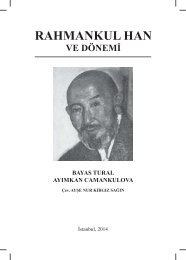THE SOVIET HISTORIOGRAPHY AND THE QUESTION OF KAZAKHSTAN’S HISTORY
SOVYET-TARIH-YAZICILIGI-ENG
SOVYET-TARIH-YAZICILIGI-ENG
Create successful ePaper yourself
Turn your PDF publications into a flip-book with our unique Google optimized e-Paper software.
44<br />
<strong>THE</strong> <strong>SOVIET</strong> <strong>HISTORIOGRAPHY</strong> <strong>AND</strong><br />
of Kazakhstan in the direction of Marxist-Leninism”; it ignited anew<br />
the official accusations against Bekmakhanov. On 10 April 1951, the<br />
Central Committee of Kazakhstan CP decided to deal with the issues<br />
raised in the article. It determined that the article’s conclusions were<br />
correct and it criticized Bekmakhanov’s bourgeois-nationalistic views. 54<br />
The article in “Pravda” became an excuse, not only to prosecute<br />
Bekmakhanov but also other Kazakh intellectuals. The historian A.<br />
Takenov expressed his opinions about the article that K. Aidarova<br />
wrote about Bekmakhanov, noting:<br />
Writers of the article were mediocre historians who could became<br />
visible among scientists only by criticizing Bekmakhanov. Based on<br />
that fact, there has been another secret power which protected them.<br />
Despite this, they only repeated their opinions during the discussion,<br />
“Pravda” newspaper published those sentences with big letters: ‘All<br />
historical sources show that, Uprising of Kenesary was neither progressive,<br />
nor revolutionary. That reactionary movement strengthened<br />
patriarchal-feudality order among the Kazakhs, caused revival of<br />
medieval Khan government and it separated Kazakhstan from Russia<br />
and great Russian people.’<br />
Those harsh words were like a directly given order. 55<br />
On 4 December 1952, Bekmakhanov was convicted. In the decision,<br />
it was written: “As the investigation files in the court show<br />
E. Bekmakhanov falsified historical knowledge and propagandized<br />
bourgeois-nationalism in his works. He praised feudality, the rich<br />
people and the reactionary Khans and sultans which fought against<br />
Russian people and tried to protect the medieval system in Kazakhstan.<br />
He used works of reactionary poets and people’s enemies who<br />
were called as “Alash Orda” to prove his bourgeois-nationalist ideas.<br />
He performed his nationalistic ideology among the people he knew,<br />
too.” 56 Based on those accusations, his conviction came with the<br />
harshest punishment. He was sent to work in the camps for 25 years<br />
based on the USSR Penal Code’s 58-10 articles’ second passage. (The<br />
aforementioned passage is about forming armed groups countrywide,<br />
or setting up an armed uprising, also taking over the government in<br />
local oblasts, or contributing to the movements in order to forcibly<br />
take over a region from USSR)<br />
54 Nurpeyisov. K., “Bekmakhanov Pen Onın Bastı Kitabı Qalay Jazalandı?”, Qazaq Tarihi,<br />
2005, No. 2.<br />
55 Takenov. A., “Eluinşi Jıldardın Basında Qazaq Tarihi Qalayqıspaqqa Alındı?”, Qazaq Tarihi.<br />
1994, No. 1, 3.<br />
56 Astana qalasındagı “Aljir” muzeylik-memorialdıq keşen materiyaldarınan.



